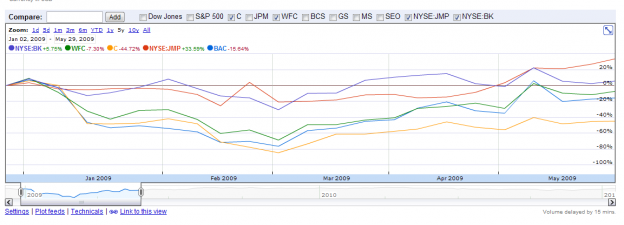Let’s look at this logic as it is being used by a couple of people suing $BAC. It is flawed…..
From Housing Wire:
Wednesday, October 12th, 2011, 5:13 pm
An old deposition of former Bank of America (BAC: 6.2099 -5.62%) CEO Ken Lewis could play a major role in ongoing shareholder litigation.Another case with allegations similar to disclosures made in the deposition was filed this week by Schwab funds. The group is now suing Ken Lewis and BofA for not making material disclosures prior to the Merrill Lynch acquisition.
The interchange Lewis had in a deposition recorded at the New York attorney general’s office two years ago is likely to be part of ongoing discussions about how much influence the Federal Reserve and Treasury Department had over Lewis and the Bank of America merger.
The deposition has Lewis admitting he made note of Merrill’s losses before the merger. However, he suggests Fed and Treasury officials were not keen on BofA backing out of the transaction, and they made their wishes known.
In the transcript of the deposition by U.S. Legal Support Inc., Lewis noted that BofA considered filing a claim to end the merger with Merrill Lynch after new losses at the financial advisory firm became apparent.
The exchange shows Lewis running through the events leading up the merger, including talks he had with then Treasury Secretary Hank Paulson and central bank officials who were persistent on BofA acquiring Merrill.
Earlier this month, media reports said shareholders plan to file suit claiming BofA’s leadership failed to disclose some $12 billion to $15 billion in losses at Merrill before it was acquired by the banking giant.
Analysts following the case point to one exchange in the deposition of Lewis, where the issue of disclosing the Merrill Lynch losses comes up between Lewis and the AG’s office.
When asked if he had some type of agreement with government officials on BofA receiving bailout funds to help with Merrill-related issues, Lewis said Paulson called him and said, “First, it would be so watered down, it wouldn’t be as strong as what we were going to say to you verbally, and secondly, this would be a disclosed event and we do not want a disclosable event.”
The examiner then asked, “When you say disclosed event, he means a disclosed event for the corporation?” To that, Lewis replied, “Correct — well, yes.”
Lewis goes on to say, “They did not want, and they didn’t think it was in our best interest, to have anything announced until you can announce the whole thing, and the promise was to get it announced before or during that earnings.”
The interviewer then asked Lewis, “They didn’t think it was in the best interest if you announced to your shareholders what you were negotiating?”
Lewis replied, “No. They thought it was in our best interest for the deal to be completed and to be able to say, ‘This is what we have, as opposed to prospectively.”
In a nutshell Schwab and the other investors argument is this: Had $BAC disclosed the Merrill losses before the merger, shareholders would have voted it down saving the company billions in losses.
Now, why is this argument flawed?
1- There should be no doubt by now that more money from the Fed and Treasury for $BAC was tied to them doing the deal. This money, at that time, more likely than not saved the bank from either a near death run on it or possible extinction.
2- While the losses at Merrill immediately following the deal were huge, $BAC’s stock price decline was not massively worse than any of the other major banks during that time period. In fact, if we look at share price performance during that time, $BAC performed better than $C and only slightly worse than $WFC
3- Currently, Merrill and its performance are a strong suit for the bank and will be even more so in the future as they continue to shed non core assets.
4- We have no factual basis for knowing the “post disclosure” votes of shareholders
So, what are the actual losses?
While there was a dip in share price post deal when the losses were disclosed those share price losses are not of a magnitude where $BAC share performance was an aberration. Because of that we cannot attribute them solely to the Merrill deal. What we can more acutely argue it that $BAC needed money from the Feds in the worst way in late 2008 early 2009. By doing this deal when they did it and getting the $$ they did, $BAC saved shareholders from far worse pain.
As for any potential losses since then due to the merger, this argument is silly. $BAC core banking results have been on a consistent upswing and share price has only fallen back to the deluge of lawsuits the past 6 months. In this respect, current shareholder suing the bank are contributory to the losses they are seeing now.
Now the argument goes the “duty to shareholders”. This is where things get tricky. If indeed Lewis’s feet were being held to the fire (does anyone doubt they were?) then what was in shareholder’s best interest? Getting Federal funds to keep the bank afloat. If his bosses (regulators) told him not to disclose, was still still obligated to or would undoing the merger have been a worse scenario?
Now, shareholder may be able to prove that $BAC should have disclosed the losses, but proving monetary losses resulted from that, given the performance of other banks at the time is a far harder sell….
